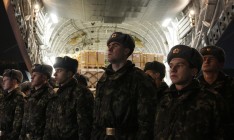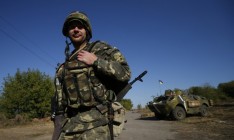Politics
race for powerOleksandr Turchynov will have the powers of a vice president

Oleksandr Turchynov, who was appointed Secretary of the National Security and Defense Council (NSDC), will have powers equal to those of vice presidents in certain countries. The law on new powers of the secretary of the NSDC drafted by the Presidential Administration will be adopted regardless of observations made by lawyers that the document will tip the balance of power in the main branches of government.
No amendments
Yesterday, the VR Committee on National Security and Defense approved for the second reading the bill by virtue of which the powers of the NSDC and its secretary will be considerably expanded. As a reminder, leader of the People’s Front faction Oleksandr Turchynov was recently appointed the head of the NSDC.
“I welcome Oleksandr Turchynov, who is currently referred to as the bloody pastor, in the role of a controller and coordinator. The powers of the NSDC must be expanded. If they do not comply with the norms of the Constitution, then the constitution should be amended,” First Deputy Chair of the Committee Semen Semenchenko (Samopomich), who was commander of the Donbas National Guard battalion, proposed at the start of the committee’s session.
As a reminder, after voting in the first reading of the bill on the NSDC last week lawyers and experts questioned several of the document’s norms. In particular, the expert administration of the Verkhovna Rada pointed out that if the bill is passed it threatens to tip the balance of the branches of power in the government. “Adoption of the law in its current edition means that the secretary of the NSDC will be granted powers that contradict the Constitution currently in effect in which it is stated that the council is a coordinating body, but it does not have the power to interfere in the work of the executive branch of power. This is risk of the concentration of power in the hands of one individual,” member of the committee Olena Sotnyk (Samopomich) told Capital.
In his turn, people’s deputy Ivan Krulko (Batkivshchyna) noted at the meeting of the committee that the law should not be adopted to meet the desires of one man. He said the expansion of powers of the NSDC secretary could be a problem in the future when some other individual is appointed to this post. However, notwithstanding the criticism of members of Batkivshchyna and Samopomich, the committee rejected all 40 amendments to the bill. Only revised amendments that do not affect the content of the document were adopted. In addition, the bill introduces the term “crisis situation” that up until now was not written in the law.
Head of the committee Serhiy Pashynskiy (People’s Front) explained that the refusal to revise the bill was that it was urgently submitted by President Petro Poroshenko for immediate adoption in order “to form legal instruments given the complicated situation in the country”. Pashynskiy reminded that it was possible not declare a state of war and hold the presidential elections thanks to the fact that a norm on the anti-terrorist operations was included in the law.
“All norms of the bill comply with the Constitution and legislation. We recommend that the document be adopted in its full version. If deputies have their own opinions, they can submit amendments to the Constitution or appeal to the Constitutional Court after the law is signed. I am ready to participate in the organizational process,” Pashynskiy summed up.
Working with new powers
Members of parliament plan to vote for the bill proposing to grant the NSDC the power to make decisions and not only draft proposals for the head of state. This means that the secretary of the NSDC will be able to independently take immediate measures in crisis situations if there are threats to national security and their execution by bodies of power will be compulsory.
Also, the NSDC secretary will coordinate and control the following spheres: fighting corruption, ensuring safety of citizens and fighting crime right down to coordinating the actions of law enforcement bodies. The proposals to the president on appointment and dismissal of the leadership of military units and law enforcement bodies will be among the secretary’s main tasks. The NSDC secretary will discuss with the president the candidates for managers of bodies of executive power, whose activity is related to issues of national security and defense. The decisions of the council will be obligatory for execution by all bodies of executive power and the NSDC secretary will control their execution.
The legislation in effect envisages that if the president prematurely steps down from office, the premier will become the head of the NSDC. Now it is being proposed that the VR speaker head the NSDC.
Despite the criticism of members of the Batkivshchyna and Samopomich parties, there are enough votes in the parliament for the adoption of the revised law on the NSDC. In particular, leader of the Radical Party Oleh Lyashko told the publication that his political force supports the initiative of the head of state. “If the bill is submitted by the president this means that he needs a person with such authority and the powers of the NSDC should have been expanded a long time ago, particularly in conditions of war in the country. But there is no unified center of administration in the ATO,” he noted.
The People’s Front will vote for the bill proposed by the Petro Poroshenko Bloc. “At the moment, the secretary of the NSDC only has responsibility, but no powers that in the current situation are imperative. Meanwhile, the criticism of the bill can be explained by the fear of revenge by the previous powers,” member of the People’s Front Andriy Teteruk told Capital.
Teteruk’s colleague in the faction Anton Herashchenko said that by virtue of the new law Turchynov will basically be “the vice president of Ukraine”. According to information that Capital possesses, the bill will be adopted at the session of the Verkhovna Rada on December 23.






 of the agreement of syndication with Financial Times Limited are strictly prohibited. Use of materials which refers to France-Presse, Reuters, Interfax-Ukraine, Ukrainian News, UNIAN agencies is strictly prohibited. Materials marked
of the agreement of syndication with Financial Times Limited are strictly prohibited. Use of materials which refers to France-Presse, Reuters, Interfax-Ukraine, Ukrainian News, UNIAN agencies is strictly prohibited. Materials marked  are published as advertisements.
are published as advertisements.